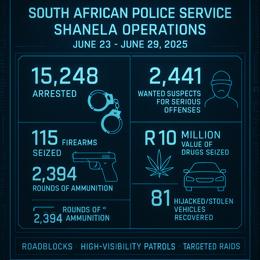Image created by AI
SAPS Disciplinary Inertia: A Year Without Resolution for Assault Incident
South Africa's commitment to upholding the rule of law and ensuring accountability within its law enforcement ranks has come under scrutiny, following a protracted internal disciplinary process within the South African Police Service (SAPS). It has been a year since the widely-condemned incident involving eight SAPS VIP protection officers accused of assaulting a civilian along the N1 in Johannesburg. Still, the concerned members remain on desk duty, highlighting systemic delays and apparent disregard for expedited justice.
This stagnation has prompted Mr. Ian Cameron, the Chairperson of the Portfolio Committee on Police, to openly criticize the internal mechanisms of the South African Police Service. The failure to resolve the matter promptly not only casts a shadow on the SAPS's commitment to accountability but also tarnishes its public image, reinforcing the narrative of entrenched police brutality and the presumed sense of impunity among police ranks.
Mr. Cameron's dissatisfaction comes against the backdrop of assurances previously given by the SAPS to the 6th Parliament Portfolio Committee on Police. The police had claimed that their internal disciplinary process—initiated immediately after the incident—would be independent of the criminal case and would be pursued without delay. However, the prolonged ordeal underscores a troubling incongruity between SAPS's promises and their actions.
Given the gravity of the situation, Mr. Cameron has taken it upon himself to seek answers from the SAPS regarding the stagnant disciplinary process and the continued employment of the officers involved. The Chairperson's query reflects the public's clamor for transparency and swiftness in the handling of misconduct within the police force, as mandated by the 2016 disciplinary regulations.
In stark contrast, SAPS did take decisive action in the case of former Captain Esmeralda Bailey, who was recently sentenced to 11 years in prison on charges of corruption, drug possession, obstruction of justice, and the negligent loss of a firearm. This case serves as a pointed reminder that the SAPS, when mobilized, can indeed administer justice against its own members who deviate from their mandate.
The Portfolio Committee on Police, while welcoming the resolution in Bailey's case, urges the SAPS to apply the same rigor and urgency to the pending disciplinary process. Public confidence needs to be restored, and doing so requires demonstrating to citizens that even those charged with their protection are not above the law. Mr. Cameron's stance echoes a broader societal expectation for SAPS officers to be exemplars of the legal system they are appointed to uphold.
The handling of internal disciplinary matters within the SAPS remains a significant barometer of its integrity and the efficacy of its leadership structures. As the oversight body responsible for policing, the Portfolio Committee on Police continues to advocate for the prompt and fair resolution of internal disciplinary cases. The committee's engagement in this matter is a testament to its unwavering commitment to fostering an ethos of accountability and transparency within South Africa's main law enforcement agency.










